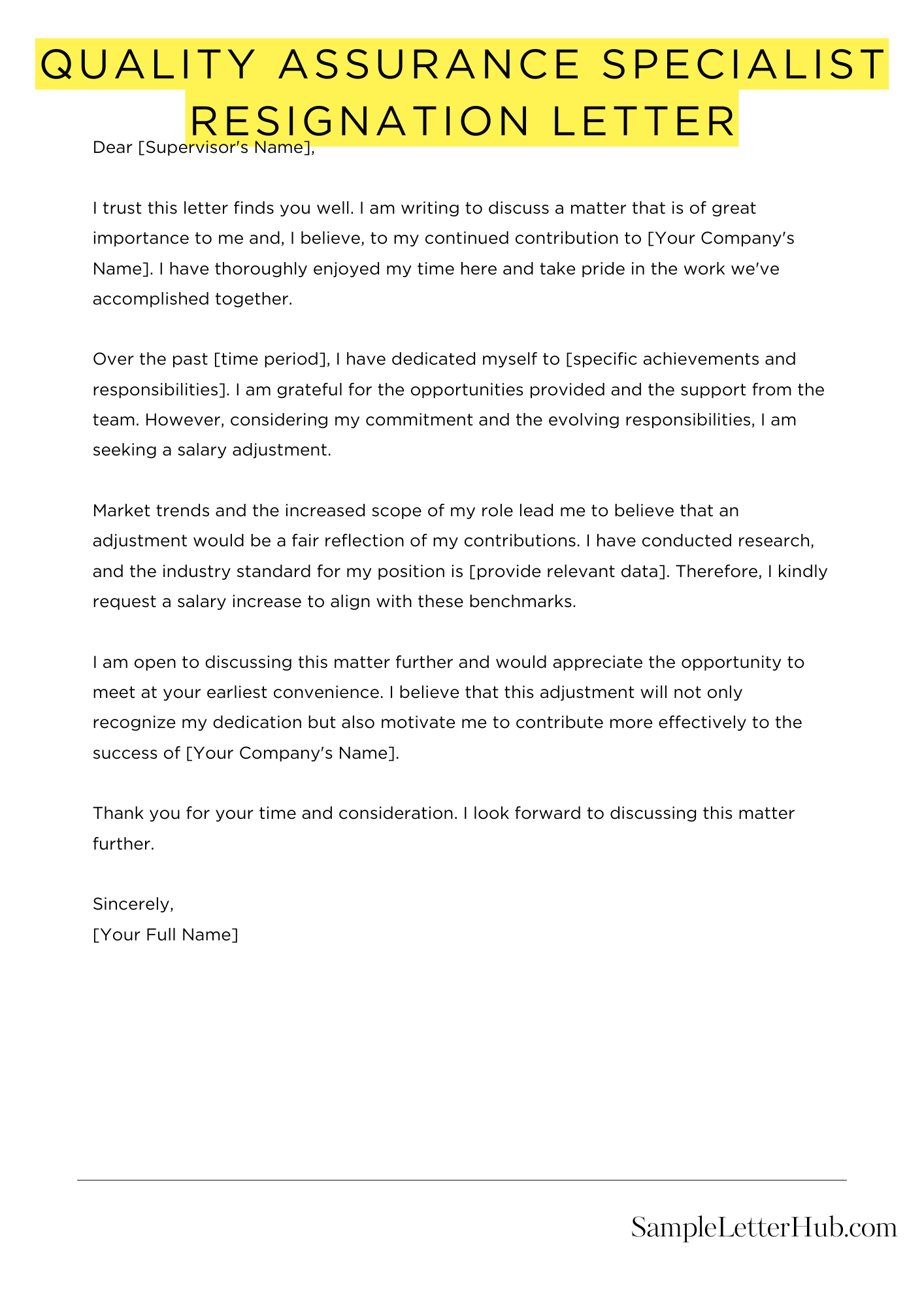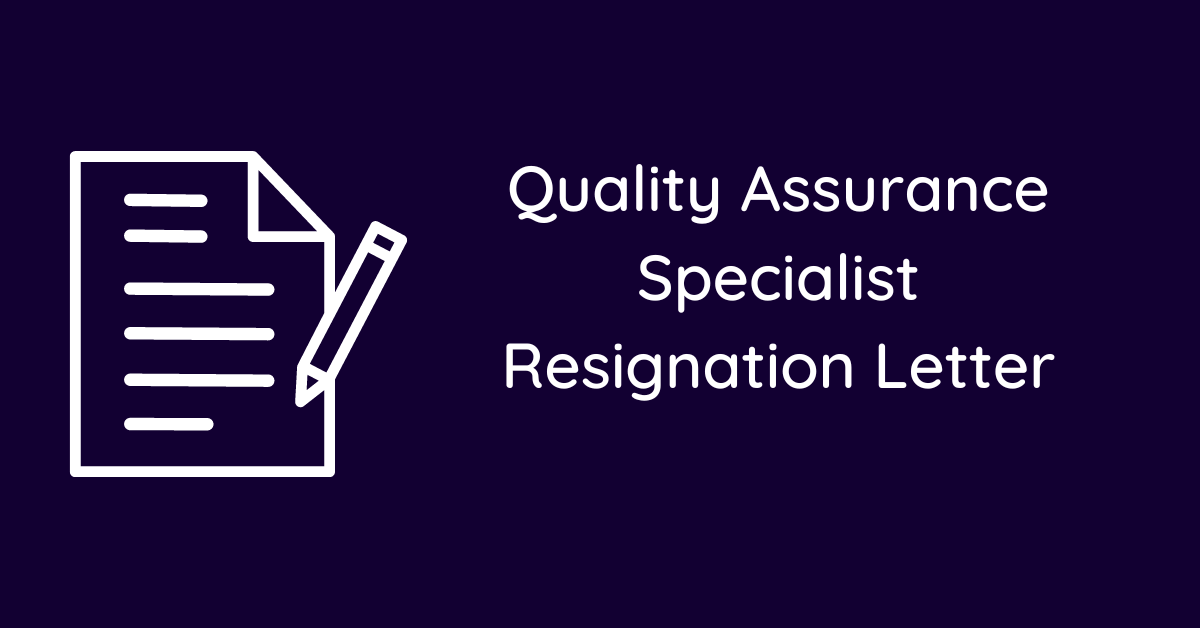When it comes to leaving a job, one way to do it is to write a clear and professional resignation letter. This letter should explain your decision to leave and be polite and humble in tone.
In this article, we’ll share an example of a quality assurance specialist resignation letter with you. This letter can be used as a template for your own resignation letter.
We’ve included a template/example quality assurance specialist resignation letter below that you can use. Be sure to personalize the letter with your own information and experiences.
Quality Assurance Specialist Resignation Letter
Dear [Hiring Manager Name],
Please accept this letter as formal notification that I will be resigning from my position as Quality Assurance Specialist at [Company Name], effective [Last Date of Employment].
I have enjoyed my time at [Company Name] and am grateful for the opportunities and experiences I have gained during my tenure. I have learned a great deal and have had the pleasure of working with a talented and dedicated team.
I wish you and the company all the best in the future.
Sincerely,
[Your Signature]
Short Quality Assurance Specialist Resignation Letter Sample
Please accept this letter as formal notification that I am resigning from my position as Quality Assurance Specialist at [Company Name]. My last day of employment will be [Your Last Day]. Thank you for the opportunity to grow and learn during my time here. I wish you and the company continued success. I am happy to assist in the transition process to ensure a smooth handover of my responsibilities.
I wish you all the best with your quality assurance specialist resignation letter.
When it’s time to say farewell, expressing your gratitude and best wishes can make the transition smoother:

How to Write a Quality Assurance Specialist Resignation Letter
1. Start with a Formal Introduction
Begin your letter with a formal salutation, such as “Dear [Manager’s Name].” Clearly state your intention to resign from your position as a Quality Assurance Specialist, along with your last date of employment.
2. Express Gratitude and Appreciation
Take this opportunity to express your gratitude for the opportunities and experiences you’ve gained during your time at the company. Highlight specific projects or accomplishments that you’re proud of and thank your manager for their support and guidance.
3. State Your Reasons for Leaving
While it’s not necessary to go into excessive detail, you can briefly state your reasons for leaving. Be honest and professional, focusing on positive aspects such as seeking new challenges or pursuing further education.
4. Offer Assistance with the Transition
Demonstrate your commitment to a smooth transition by offering to help train your replacement or assist with any ongoing projects. This shows that you’re not just leaving the company but also care about its well-being.
5. End with a Professional Closing
Conclude your letter with a formal closing, such as “Sincerely,” followed by your typed name. You can also add a personal touch by expressing your best wishes for the company’s continued success.
6 Most Frequently Asked Questions About Quality Assurance Specialist Resignation Letters
When it comes to writing a resignation letter for a Quality Assurance Specialist role, there are certain frequently asked questions that arise. Here are the top 6 questions and their respective answers to help you craft an effective resignation letter:
What is the appropriate format for a Quality Assurance Specialist resignation letter?
A Quality Assurance Specialist resignation letter should follow a professional and formal format. It should include your name, address, contact information, the date, the name of the company, the company address, and the salutation. Clearly state your intention to resign from your position as a Quality Assurance Specialist, along with your last date of employment. Express your gratitude for the opportunity to work at the company and highlight any key accomplishments or contributions you made during your tenure.
What should I include in the body of my resignation letter?
In the body of your resignation letter, you can elaborate on your reasons for leaving, if you feel comfortable doing so. Keep it brief and professional, and avoid going into excessive detail. You can also express your appreciation for the company and your colleagues, and wish them well in the future.
How much notice should I give?
The amount of notice you should give will vary depending on your contract and company policy. It is generally considered good practice to provide at least two weeks’ notice, but some companies may require more. Check your contract or company handbook to determine the specific notice period required.
What if I have any outstanding projects or tasks?
If you have any outstanding projects or tasks when you resign, it is important to address them in your resignation letter. Offer to assist with the transition and provide any necessary documentation or handover notes to ensure a smooth handover of your responsibilities.
Should I offer to help train my replacement?
Offering to help train your replacement is a thoughtful gesture that can demonstrate your commitment to the company and your desire to ensure a smooth transition. If you have the time and resources, it can be a valuable way to contribute to the team and show your support.
What if I am leaving on bad terms?
If you are leaving on bad terms, it is important to remain professional and respectful in your resignation letter. Avoid making negative comments or accusations, and focus on expressing your gratitude for the opportunity to work at the company. Keep your letter brief and to the point, and avoid going into unnecessary detail.
Before making the decision to resign from your job, it’s essential to consider the legal aspects:
Understanding your emotions after quitting your job is important. Explore why you might be feeling sad:
Related
- Resignation letter sample
- Forced resignation letter
- Resignation letter due to going abroad
- Resignation letter due to marriage
- Resignation letter due to other opportunity
- Resignation letter due to mistake

